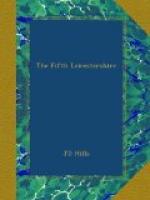Beasley, commanding “C” Company, and Lieut.
A.P. Marsh, of “B” Company, were both
wounded, and had to be sent away to Hospital some
hours later. The same night we gave up these
undesirable trenches, together with “A5”
and “A8” to the 4th Battalion, and took
instead “49,” “50” and the
Support “51” from the Cheshires of the
5th Division. These trenches were about 200 yards
from the enemy except at the junction of “49”
and “50,” where a small salient in his
line brought him to within 80 yards. The sniping
here was as deadly as at Kemmel, though round the
corner in “A1” we could have danced on
the parapet and attracted no attention. On the
other hand “49” and “50” were
comfortably built, whereas “A1” was shallow
and narrow and half filled with tunnellers’
sandbags, for it contained three long mine shafts,
two of which were already under the German lines.
“A2,” “3” and “4”
were the most peaceful of our sector, and the only
disturbance here during the tour was when one of a
small burst of crumps blew up our bomb store and blocked
the trench for a time. This was on the 5th, and
after it we were left in peace, until, relieved by
the Staffordshires, we marched back to Ouderdom, feeling
that we had escaped from our first tour in the ill-famed
salient fairly cheaply. Even so, we had lost two
officers and 24 O. Ranks wounded, and seven killed,
a rate which, if kept up, would soon very seriously
deplete our ranks.
[Illustration: General map of
Flanders to illustrate Chap’ II & III.]
On reaching Ouderdom, we found that some huts on the
Vlamertinghe road had now been allotted us instead
of our bivouac field, and as on the following day
it rained hard, we were not sorry. Our satisfaction,
however, was short-lived, for the hut roofs were of
wood only, and leaked in so many places that many
were absolutely uninhabitable and had to be abandoned.
At the same time some short lengths of shelter trench
which we had dug in case of shelling were completely
filled with water, so that anyone desiring shelter
must needs have a bath as well. This wet weather,
coupled with a previous shortage of water in the trenches,
and the generally unhealthy state of the salient,
brought a considerable amount of sickness and slight
dysentry, and although we did not send many to Hospital,
the health of the Battalion on the whole was bad, and
we seemed to have lost for the time our energy.
Probably a fortnight in good surroundings would have
cured us completely, and even after eight days at
rest we were in a better state, but on the 13th we
were once more ordered into the line and the good
work was undone, for the sickness returned with increased
vigour.




